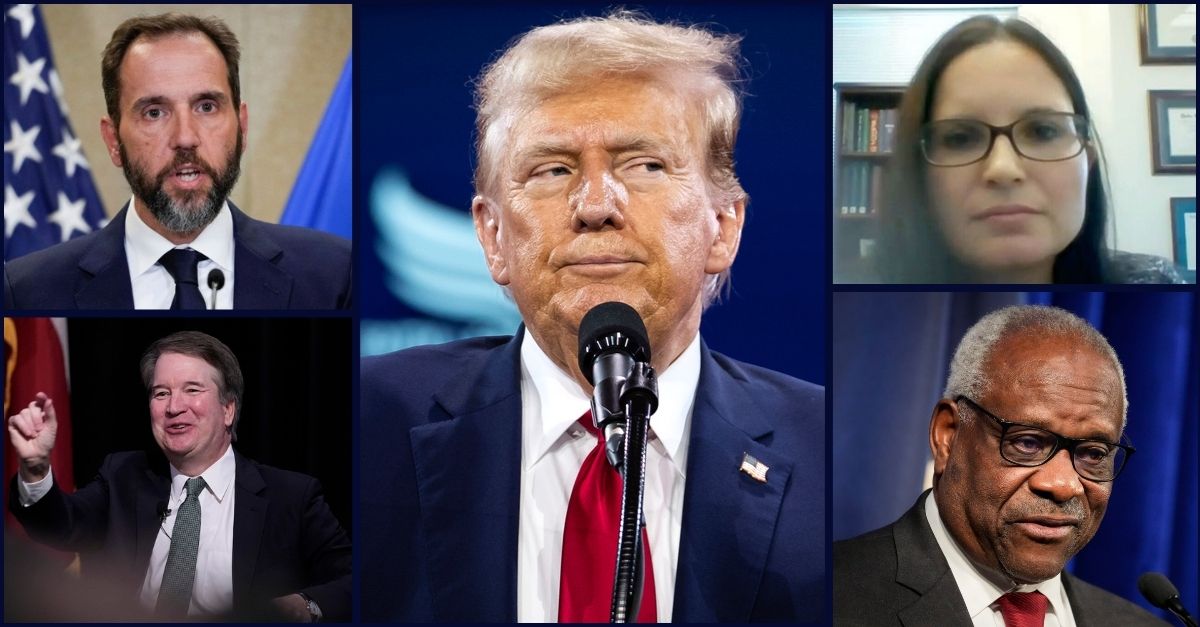
Clockwise, from top left: Jack Smith (AP Photo/J. Scott Applewhite, File), Donald Trump (Allison Bailey/NurPhoto via AP), Judge Aileen Cannon (U.S. Senate), Justice Clarence Thomas (Drew Angerer/Getty Images), Justice Brett Kavanaugh (AP Photo/Eric Gay).
With a shot across the bow, special counsel Jack Smith on Monday filed his office’s appeal of a lower court’s early summer opinion that dismissed the Mar-a-Lago indictment against Donald Trump.
In an 81-page filing with the U.S. Court of Appeals for the 11th Circuit, the long-stymied prosecutor sought to revive his case against the 45th president after U.S. District Judge Aileen Cannon, in surprise fashion, ordered a kibosh on proceedings based on a novel understanding of the Appointments Clause of the U.S. Constitution.
In ruling that Smith was not lawfully appointed to his position, the lower court judge broke with all known precedent on the issue — something the special counsel’s office immediately noted at the time of the dismissal and reiterated in their Monday afternoon brief.
The brief cites the “long tradition of special-counsel appointments” by attorneys general and the concomitant “endorsement of that practice” by Congress as dispositive reminders that Cannon’s ruling was far afield. The filing goes on to rubbish the Southern Florida judge’s “contrary view” as “at odds with widespread and longstanding appointment practices” and argues that her use of the operative constitutional clause to dismiss Trump’s Espionage Act indictment “conflicts with an otherwise unbroken course of decisions.”
“The Attorney General validly appointed the Special Counsel, who is also properly funded,” Smith’s argument begins. “In ruling otherwise, the district court deviated from binding Supreme Court precedent, misconstrued the statutes that authorized the Special Counsel’s appointment, and took inadequate account of the longstanding history of Attorney General appointments of special counsels.”
To hear the special counsel tell it, four total statutes provide the panoply of black letter law to support Smith’s appointment on a basic level — and to hire the various staffers who work alongside him: 28 U.S.C. §§ 515(b) and 533(1); as well as 28 U.S.C. §§ 509 and 510.
The first two statutes cited by the prosecutors in their brief deal with: (1) “special” attorneys or assistants who are “specially retained” by the attorney general; who may (2) appoint such attorneys “to detect and prosecute crimes against the United States,” respectively.
The second two statutes outline broad grants of authority conferred on the U.S. Attorney General — with three distinct, spelled-out, limits on such power — within the U.S. Department of Justice.
Cannon, for her part, distinctly rejected the argument that any of those four statutes authorized Smith’s appointment.
In binning the prosecutor’s power and granting the man who appointed her to the bench a huge procedural victory, the lower court lectured Smith over his reliance on the “specially retained” language in §515(b).
Describing the statute as merely “descriptive,” and “about already-retained attorneys,” Cannon’s 93-page opinion finds that “the text of Section 515(b) plainly does not announce or give anyone the active power to ‘retain’ anyone afresh but simply notes specific requirements or features about attorneys already ‘specially retained’ in the past.”
Smith directly aims to rebut the lower court’s understanding of the grammar at play in the statute as entirely off-base.
“The district court’s determination that the phrase ‘specially retained’ in Section 515(b) is a past tense verb that only applies to already-retained attorneys misunderstands the statute’s grammatical construction—’retained’ and ‘appointed’ are past participles that take their tense from the surrounding present-tense verbs — and results in a nonsensical interpretation under which an attorney must be hired and only then (potentially minutes later) could become ‘specially retained’ as a special counsel,” the brief argues.
More Law&Crime coverage: All eyes on Jack Smith as special counsel’s appeal combating Trump’s Mar-a-Lago case dismissal is finally set to launch
Smith also says that each of the four cited statutes has been looked at and approved by the nation’s high court before.
In the landmark Supreme Court case of United States v. Nixon, the justices explicitly said those exact same statutes “vested in” the attorney general “the power to appoint subordinate officers to assist him in the discharge of his duties.”
In Cannon’s opinion, however, she dismissed that statement as “dicta” because, among other reasons, the case itself was not about “the Attorney General’s statutory appointment authority or the Appointments Clause more generally.”
Smith rejects this understanding of the Nixon precedent at length:
Apart from the district court below, every court to consider the question has concluded that the Supreme Court’s determination that those statutes authorized the Attorney General to appoint the Watergate Special Prosecutor was necessary to the decision that a justiciable controversy existed and therefore constitutes a holding that binds lower courts.
The district court erred when it deemed that conclusion unpersuasive dicta. Nixon’s statutory analysis was integral to the Court’s “ultimate conclusion” and therefore “authoritative.” The district court likewise erred in reasoning that the Supreme Court had assumed the issue without deciding. The Supreme Court regularly uses qualifying language to indicate assumed premises but included no such caveat in Nixon when discussing the Attorney General’s authority to appoint the Special Prosecutor. Nixon therefore binds this Court, just as it did the district court, and reversal is warranted on that ground alone.
Smith paints the case as relatively simple and plain — and chides the lower court for allegedly complicating the waters.
“The sole question this case presents is whether Congress has by law authorized the Attorney General to appoint the Special Counsel,” the brief reads. “Congress has done so in Sections 509, 510, 515, and 533, and the district court was wrong to view that straightforward question of statutory construction as implicating concerns about ‘structural liberty,’ ‘structural integrity,’ ‘democratic accountability,’ or ‘usurpation … by indirection.’ Congress is free to vest a department head with the power to appoint inferior officers based on its assessment of ‘administrative convenience.’ Where, as here, Congress does so, it fully satisfies the Appointments Clause.”
Smith attempts to buoy his argument by staking out the “long history of appointments of special counsels” and says this history “reflects” Attorney General Merrick Garland’s “authority to make the appointment” in the present case.
And in something of a citational repartee meant to push back against Cannon’s reliance on Justice Clarence Thomas, the government’s brief cites Justice Brett Kavanaugh to make their case.
Again the Smith brief, at length:
For more than 150 years, Attorneys General have appointed special counsels to investigate and prosecute some of the nation’s most consequential cases. This “deeply rooted tradition of appointing an outside prosecutor to run particular federal investigations,” Brett M. Kavanaugh, The President and the Independent Counsel, 86 Geo. L.J. 2133, 2142-43 (1998), further confirms the lawfulness of the Special Counsel’s appointment.
The brief also goes on to offer a slippery slope argument about what extending Cannon’s logic writ large might mean.
“The district court’s rationale could jeopardize the longstanding operation of the Justice Department and call into question hundreds of appointments throughout the Executive Branch,” the brief reads.
Smith’s brief requests an oral argument on the issue. All-but assured is a follow-up filing by Trump’s defense attorneys as they try to keep the lower court ruling intact before a potentially dubious appellate panel.
More Law&Crime coverage: ‘Nothing’ the special counsel did was ‘valid’: Hunter Biden lauds Justice Thomas-inspired tossing of Trump’s Mar-a-Lago case in post-conviction attack on gun indictment
Cannon has been rebuked by the 11th Circuit before.
In 2022, a three-judge panel harshly overturned her appointment of a special master to oversee the documents culled from Trump’s Palm Beach estate during the raid in August of that year.
“This appeal requires us to consider whether the district court had jurisdiction to block the United States from using lawfully seized records in a criminal investigation. The answer is no,” the panel wrote. “The law is clear. We cannot write a rule that allows any subject of a search warrant to block government investigations after the execution of the warrant. Nor can we write a rule that allows only former presidents to do so.”
More Law&Crime coverage: Lawyer who drafted special counsel regulations predicts fate of Judge Cannon’s ‘deeply dangerous’ dismissal of Trump’s Mar-a-Lago indictment
Throughout the pendency of the case, Cannon was dogged by complaints that she allowed the co-defendants and their allies wide latitude to delay, file frivolous legal documents that push untenable legal theories, push back deadlines, and otherwise engage in dilatory tactics — with an eye toward making sure there is not a trial before the 2024 presidential election. That all came to a head late Monday.
Have a tip we should know? [email protected]









